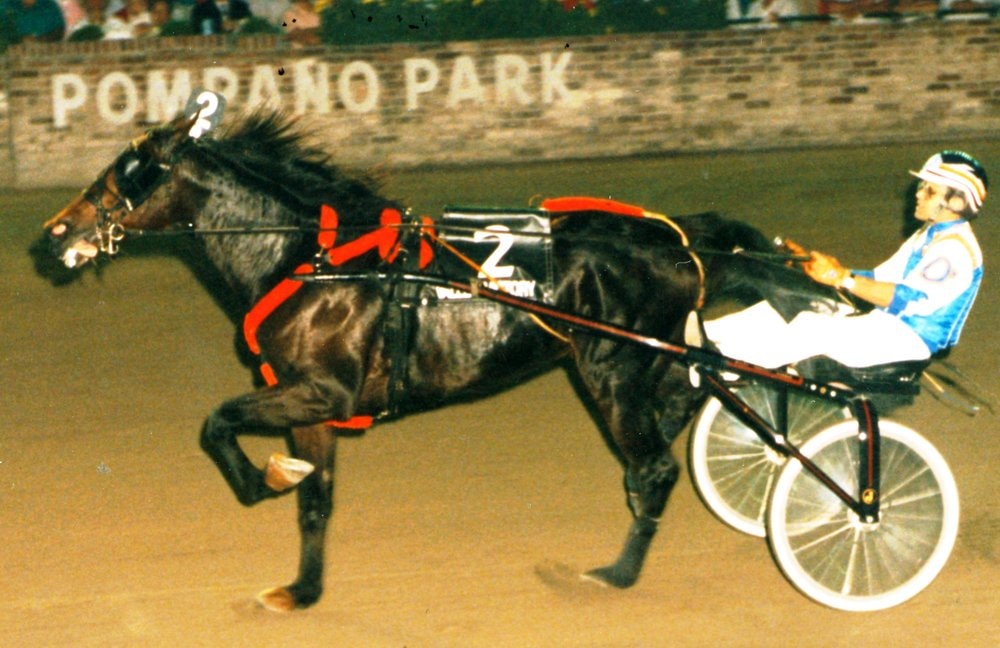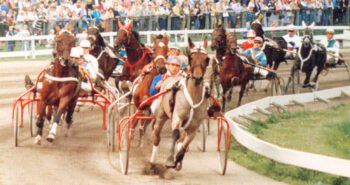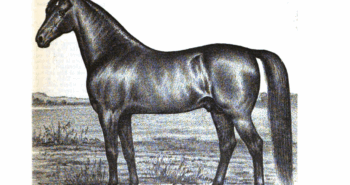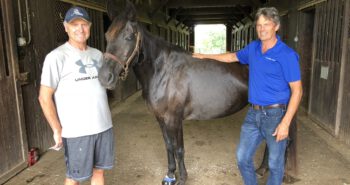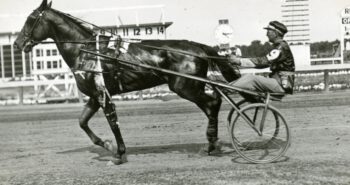He is one of the most influential and best stallions of all times, and has been a breed changer for American trotting. It could easily have been very different, because Valley Victory was nearly lost to US breeders twice before he even started his illustrious stallion career. Sweden’s loss was North America’s gain as the super stallion proved to be a real breed changer despite poor fertility.
Bred by Bill Weaver’s Valley High Stables, Valley Victory was purchased for $60,000 by Arlene Traub as a yearling. The colt was initially trained by Jan Johnson and Berndt Lindstedt at Continental Farms. In January 1988, after a severe colic attack, the colt was rushed to the University of Florida clinic in Gainesville, Florida. The horse had to undergo surgery for which the prognosis was negative, but fortunately survived the surgery. Upon returning to training in May, he was assigned to Steve Elliot. Despite losing out on several months of training, the son of Baltic Speed caught up with the other two-year-olds relatively quickly. His racing debut came in late August but he really made everybody take notice in a conditioned trot on Sept 30 when he put in a 27.1 / (1.07,6) final quarter to win at The Red Mile.
It was an almost unheard of speed for a two-year-old, and Valley Victory did it with ridiculous ease. Still, it hadn’t been smooth sailing for Elliot. In an article on HarnessLink, Elliot was quoted as saying the colt was goofy and lacking focus. According to his trainer, “it took a long time to get his mind right. He broke three jog carts and a couple of race bikes before we got his head on straight.”
When November came around his head was on straight, and Valley Victory was the clear favorite in Breeders Crown final after an impressive win in his elimination. Second-favorite Kaizer Lobell took the lead in the final and held a high tempo. As Ziggy Hanover went first over to challenge the leader, driver Bill O’Donnell ensured Valley Victory had his back. As the field were turning from home, O’Donnell let the colt loose, and Valley Victory exploded past the opposition and won with ease in track record time 1:58.1f (1.13,5). After four wins in seven starts at 2, Valley Victory was voted 2 Year Old Trotting Colt of the Year.
A career-ending infection
At 3, Valley Victory continued where he left off. Seven straight wins, including the New Jersey Sire Stakes, in 1:55.3 (1.11,8), and the Yonkers Trot, made Valley Victory the favorite going into the 1989 Hambletonian. In the final he was up against another brilliant foal of Baltic Speed, namely Peace Corps, who was coming into the race on a 17-race win streak and seen as the primary contender. Promoting the duel, the Meadowlands had made thousands of “I like the colt” and “I like the filly” buttons.
There would, however, never be a great coronation of Valley Victory, and no colt buttons were handed out. A little over a week prior to the Hambletonian, Steve Elliott’s stable was hit by a viral infection, and when a stablemate died Valley Victory was scratched from the Beacon Course as a precaution. Valley Victory was affected, but his life was never in danger. However, the horse would never race again while Park Avenue Joe and Probe secured eternal fame as the first pair of Hambletonian winners after a dead heat in the race-off. Looking back at it, it’s hard to conceive of Valley Victory losing the Hambletonian to the winning duo under normal circumstances as the colt otherwise always had their number. Bill O’Donnell was crystal clear in his assessment of the colt, “He was so much better than the rest. It didn’t matter in the race what you did or what position you took. He had so much speed that he overtook his opponents as if they were standing still.” It didn’t matter, though, as Valley Victory was forced into retirement with 11 victories and one second place finish in 14 starts, career earnings of $485,307 and a record of 1:55.3 (1.11,8).
A lawsuit kept him from going to Sweden
In the 1980s European buyers bought many of great stallion prospects in the US. At the end of the 1987 season, for example, Swedish interests concluded deals for both Mack Lobell and Napoletano. The following year, Florida Pro was sold to Sweden while his son Sugarcane Hanover ended up in Norway, and in 1989 the great Speedy Somolli was sold to Swedish interest. So was, in fact, Valley Victory. An agreement, supposedly for 2 million dollars, was reached with Jan Johnson as the intermediary and the Swedish buyers even advertised Valley Victory in the Swedish magazine Travronden. Shortly thereafter Tony Pedone and George Segal approached owner Arlene Traub. Pedone, a prominent horse owner, wasn’t happy with exporting great stallions and stallion prospects to Europe and teamed up with George Segal to purchase Valley Victory. They made an offer to buy Valley Victory from Arlene Traub to stand him in stud in New Jersey. Their offer, reputedly for 3 million dollars, was accepted, but the matter ended up with the lawyers. While the Swedish buyers received financial compensation, America got to keep on one of the best stallions of all time.
A breed changer
With the legal wranglings out of the way, Valley Victory stood his first season at stud at Southwind Farms in New Jersey in 1990. His first crop proved to be an absolute revelation. The 84 foals were far better than their competitors, earned close to $1,7 million in their first season and made Valley Victory the leading sire in the crop. The get followed up next year with Victory Dream winning the Hambletonian. For good measure, five of the ten finalists were sons of Valley Victory. Donerail was an excellent son in the next crop, that also contained Hambletonian Oaks winner Lookout Victory. didn’t contain any Hambletonian finalists, it did contain Donerail, the 1993 crop contained Continentalvictory, Lindy Lane and Act of Grace. Yankee Glide and Hambletonian Oaks-winner Must Be Victory were standouts in the 94 crop while Hambletonian-winner Muscles Yankee was dominant the following year. Because his semen couldn’t be shipped, he had very few foals in Europe. There were standouts there too, though, as a result of mares exported while in foal. In Germany the colt General November, out of a full sister to Florida Pro, won the 1996 Derby. Record OK and Amity LB were among the best horses in the Italian 1991 and 1997 crops, respectively.
However, this couldn’t go on for too long. Like some other amazing stallions, Valley Victory had severe fertility issues and the number of foals were down close to single digits. He passed on high speed, early speed, excellent gait and a phlegmatic character to his get. Expect for Victory Dream, his sons did not struggle with fertility issues. As Valley Victory’s foals numbers plummeted, numerous sons picked up the mantle with almost equal success.
A tremendous desire to race
According to Art Zubrod, manager in the Valley Victory Syndicate, “Valley Victory passed on terrific qualities to his youngsters. He produced horses that had a low head carriage, with long, fluid gaits, and they possessed a tremendous desire to race. They could overcome a lot in terms of training. A trainer could make a mistake with a Valley Victory colt and the colt would just seem to forget it, and look the other way. Most all had a very calm demeanor. Whatever you asked them to do, it didn’t seem to be a problem for them.”
That forgiving attitude, calm demeanor and desire to race are all attributes seen in Star’s Pride – maybe it’s no surprise that Valley Victory’s pedigree is built upon the former Hanover great? Valley Victory’s sire is 3×4 linebred on Star’s Pride, as is his dam Valley Victoria. At stud, though, he crossed best with Speedy Crown, often in a 4×2 cross, but that could certainly be because he had multiple crosses to Star’s Pride was did best when bred away from that.
Valley Victory was inducted into the Harness Racing Living Hall of Fame in 2002. He passed away nine years later, on March 4, 2011 after suffering kidney complications. The legendary trotter is buried at the Walnut Hall Horse Cemetery.
Valley victory
Bay colt born in Cream Ridge, NJ on May 13, 1986. Died in Lexington, KY on Mar 4, 2011.
Baltic Speed – Valley Victory (Bonefish)
14 starts: 11-1-0 – 3,1:55,3 (1.11,8) – $485,307
Breeder: Bill Weaver / Valley High Stables
Owners: Arlene Traub, Valley Victory Syndicate
Trainers: Jan Johnson, Steve Elliott
Drivers: Bill O’Donnell
Groom: –

